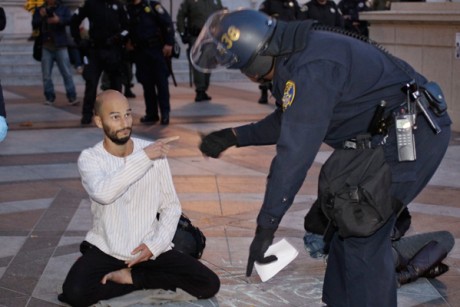From the "Occupy Wall Street" section at The Huffington Post
As a spiritual person, I have felt aloof from the Occupy Wall Street movement. I have thought about this aloofness a great deal, spoken and dialogued about it, and written about it, but I still struggle to put my head and heart together over how I can serve and contribute to Occupy and within the realm of social justice as a whole.
At a recent panel discussion at Union Theological Seminary, entitled "Being Mad And What To Do About It: What Occupiers And The Occupied Can Learn From Interfaith Dialogue," my frustration was crystallized to a certain extent. As my friend Samir Selmanovic spoke eloquently about the need to deepen our compassionate spirit in our dialogue with the "other," i.e the people who run the machine of Wall Street, and as I heard the responses from Occupiers in the audience who refused to acknowledge the need for any such kind of dialogue, the nature of my own disconnection from the Occupy movement became more clear.
I felt that, as natural and acceptable as it is in one sense to feel anger at some of the entities on Wall Street. the "vampire squids" and "evil bankers," and as natural as it is to respond to being dehumanized by such entities by dehumanizing them in return, as a spiritual person my engagement with this immense problem must go deeper. It must include yet transcend the rage, exasperation, and frustration all of us feel.
One can say that these "evil bankers" don't deserve a compassionate dialogue, yet compassion is multifaceted. It is not just good vibes, but the strength of providing what is truly needed for someone to give up their selfishness and illusion, even if that means the strong arm of justice and the clear light of truth.
One can say that because of the power dynamics at hand, because of the immense wealth and influence that Wall Street has in this discussion, that to engage with them is fruitless. Yet there is nothing more powerful than a spiritual response to injustice and inequality. If you doubt what I am saying, just look at the lives of Martin Luther King and Mahatma Gandhi, among many others. The divinity behind their voice was what gave them the power to make such immense change.
I can relate to the struggle Thomas Merton went through in the 1960s, as he lived his life as a Christian monk yet was deeply drawn into the monumental struggles of civil rights and nuclear war. As a committed spiritualist, his response to these issues required an incredible amount of depth and clarity. One passage, from his book "Conjectures of a Guilty Bystander," elucidates my feelings towards how we should view the "Other" or our "enemy" much better that I could ever say:
The tactic of nonviolence is a tactic of love that seeks the salvation and redemption of the opponent, not his castigation, humiliation and defeat. A pretended nonviolence that seeks to defeat and humiliate the adversary by spiritual instead of physical attack is little more than a confession of weakness. This may be easy to talk about in theory. It is not easy to practice, especially when the adversary is aroused to a bitter and violent defense of an injustice which he believes to be just. We must therefore be careful how we talk about our opponents, and still more careful how we regulate our differences with our collaborators.I was particularly impressed by what author/Wall Street veteran Monika Mitchell said during the panel at Union. She made it very clear (and also does so through the powerful book, Conversations With Wall Street, that she and her husband Peter Ressler wrote) that Wall Street is full of living, breathing, even ethical human beings who are deeply affected by the transgressions that have happened, and who deeply desire to bring the integral and the personal back into the culture of Wall Street.
I was also moved by a comment Samir made, in which he wondered and called out for people to minister and counsel to the people within the crypt of Wall Street itself. I told him of my friend Rasanath, whom I have lived with as a monk for the past three years, and whose remarkable experience of giving up a lucrative career with Bank of America to live as a monk has given him the perspective and calling to become a spiritual guide for many people on the Street.
The only response to any injustice I can give, as a spiritual person, is a humane response. It is a response which doesn't ignore the injustice at hand but which transmutes into something that actually moves and heals. I ask our fellow Occupiers to consider the language, tone, and motivation of their response, so that we can deepen our ability to affect the change we seek.

1 comment:
While reading it, this song came to mind: http://youtu.be/D7l7yXETHOo
Post a Comment